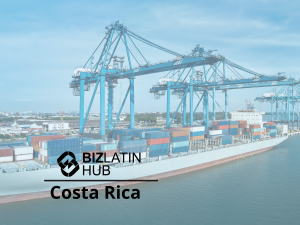Costa Rica continues to be a leading destination for entrepreneurs and investors in Central America, offering a robust market with significant growth potential. In 2023, Foreign Direct Investment (FDI) flows in Costa Rica reached US$3,788 million, marking a 20% increase from the previous year. This growth trend has continued into 2024, with FDI flows in the first quarter alone reaching a historic US$1,188.9 million, a 42% increase compared to the same period in 2023. The country’s appeal to investors is further reinforced by its strong economic performance. Costa Rica’s GDP grew by 5.1% in 2023, surpassing global GDP growth by nearly two percentage points. This economic dynamism is driven by various sectors, including exports, productive chains, and increased domestic consumption stimulated by job creation.
As businesses look for new investment opportunities in markets across Latin America, many settle on Costa Rica as part of their expansion plans and utilize its people, agriculture, and expertise to enjoy long-term growth. Below, we share reasons why you should consider a venture in the country, explore why Costa Rica is now at the center of entrepreneurship in Latin America, and offer advice on establishing a Costa Rican business to maximize profits.
Entrepreneurship in Costa Rica: Opportunities in green energy

In 2023, Costa Rica’s technology exports have grown significantly, with ICT service exports reaching $2.13 billion, representing 14.4% of total service exports, according to the OECD Ilibrary. The country’s tech sector is experiencing robust growth, with projections indicating an increase of $180.2 million (55.05%) between 2023 and 2028[3].
Expat and entrepreneurship paradise
According to an InterNations study, Costa Rica is the sixth most attractive country in the world to expats, with more and more choosing to emigrate to the country. Costa Rica has the highest percentage of immigrants in Latin America, measuring in at 9% of the population, as visas, work permits, international schools, quality of life, low cost of living and lodging all add up to make the country one of the most favorable in the region. In such an ever-changing and diverse nation, having access to talent from all four corners of the globe helps to create more innovative and diverse workforces, enabling high levels of productivity and profitability.
Data from Worldometers shows that Costa Rica’s population is set to rise to 5 million by the end of 2019, with 83.8 % of the population living in urban areas. Not only does a swelling in population lead to higher levels of entrepreneurship, but it encourages investors to set foot in the country and sell more of its products and services to a growing, middle-class market.
Booming tech industry
Over the past ten years, Costa Rica has made a name for itself as the Silicon Valley of Latin America thanks to its highly-educated workforce, English-speaking populous and investment incentives from the government, such as free trade zones and hubs in San José. Despite a high concentration of businesses operating out of a single location, businesses manage to compete both nationally and internationally across technological sectors like manufacturing, microchips, life sciences, and other technology companies, including software and fintech.
The technology landscape has evolved beyond traditional exports, with San José emerging as a major technological hub hosting operations from global tech giants like IBM and Microsoft. The startup ecosystem has also matured, with Costa Rica ranking as the 8th best country in Latin America for startups in 2024. This technological advancement has created a ripple effect across various sectors, particularly evident in the country’s thriving medical device industry, which now represents 42% of total exports valued at $7.6 billion.
The growth in technology has been complemented by strong business services expansion, with the sector projected to grow by 6.5% in 2023 and 6.8% in 2024. This growth is particularly driven by companies in free trade zones, offering services such as financial management consultancy, business support activities, and technological solutions for the digital economy.
Stable political landscape for doing business
Last year, center-left candidate Carlos Alvarado, who previously served as the country’s labor and social security minister, won the presidential election by a wide margin. He wants to create a government of ‘national unity’ and has implemented a series of new policies, including environmental, foreign investment, and public security policies, designed to unify the nation and encourage both local and international businesses to invest in the country.
Costa Rica remains the only Central American nation without its own standing army and is one of the most politically stable countries in the region. Its current political climate serves as a cushion to businesses and enables them to trade, invest, and expand without uncertainty.
Attractive labor market in Costa Rica

Costa Rica maintains its position as a leader in Latin America for innovation and living standards, though unemployment remains a challenge. As of October 2024, unemployment stands at 8.5%, with 201,124 individuals seeking work. With deflation at -0.79% and a GDP per capita of US$14,025.86, the country continues to provide high-quality healthcare and education to its citizens while offering businesses access to a skilled workforce. The GDP per capita is projected to reach US$14,587 by the end of 2024, reflecting the country’s sustained economic growth despite challenges.
As well as providing an abundance of well-educated citizens, the country’s gross average income per capita is considerably lower than in the United States. The average Costa Rican earns around US$6,810 per annum, compared with the United States’ US$47,390. This demonstrates the value of registering a company in Costa Rica and utilizing its workforce across sectors such as manufacturing, customer service, product development, and tourism, and allows startups to mitigate risk in one country, before expanding across Latin America.
Be part of entrepreneurship in Costa Rica
If you’re considering entrepreneurship in Costa Rica in 2019 and beyond, there are lots of things that you must take into consideration. As well as incorporating a local company that matters related to legal compliance, you must also think about recruitment, due diligence, human resources and more.
At Biz Latin Hub, we offer a range of services designed for entrepreneurs just like you, whether you’re planning to expand your business into the country or set up a new company. Let us support you and your business in Costa Rica and get in touch with our team of experts today.





